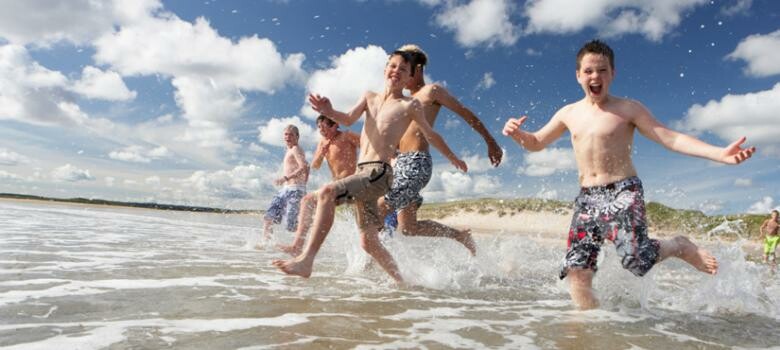Healthy Summer Travel Trips

Whether you’re relaxing at the beach or exploring a new city, you’ll want to stay healthy so you can enjoy every minute of your vacation. Kelli Clear, FNP-BC, MSN, RN, a family medicine provider at Duke Primary Care Meadowmont in Chapel Hill, offers these tips.
- Plan ahead for overseas travel. Check to see if any immunizations are needed at your destination. The CDC is a good resource. If you need a vaccine, visit a travel clinic or your primary care provider four to six weeks before your trip; many immunizations need time to take effect.
- Hydrate. Skip alcohol, caffeine, and soda and drink plenty of water. Bring a refillable water bottle that you can fill up at the airport, in restaurants, and at your hotel. No matter where you travel, you’re likely to experience hot weather that’s either drier or more humid than you’re used to. Staying hydrated will keep your body cool.
- Use sun protection. Apply sunscreen with an SPF of at least 30. Reapply it every couple of hours and after getting wet—even if the product is labeled as water-resistant. Wear a hat with a wide brim and sunglasses with 100% UV protection. If you’ll be in the sun for long periods—for example, on a hike or bike ride—look into clothing with built-in ultraviolet protection.
- Bring insect repellent. Use a separate product; avoid combination products that include sunscreen and insect repellent. To prevent mosquito bites, look for products containing DEET, and steer clear of areas with standing water, where the insects are likely to breed. If you’re severely allergic to stinging insects, keep your auto-injectible epinephrine handy—and check the expiration date before you pack it.
- Stay active. Exercise will boost your energy and mood. It can also counterbalance heavy restaurant meals you may eat while you’re away. If you’re in a car, on a flight, or even lounging at the beach, take a break and walk once every two hours. This will get your blood circulating and prevent serious blood clots from forming.
- Pack healthy snacks. Food options at airports and roadside rest stops aren’t always healthy. Pack sandwiches, fruits and vegetables, granola bars, and trail mix to keep you fueled while you’re on the road.
- Be water-safe. Children should be supervised at all times while at the pool or beach, and all adults should be trained in CPR. Look for community swim lessons to make sure all family members have basic water skills.
- Wear protective gear. This means a helmet when bicycling, a life jacket when boating, and closed, supportive shoes for hiking. (Save the flip-flops for the beach or poolside.)
- Pack a first aid kit. In addition to bandages, antibiotic ointment, and pain relievers, you’ll want to pack tweezers, over-the-counter anti-diarrheal medicine, laxatives, and—if you’ll be on the water—anti-motion sickness medicine. If you’re bringing prescription medications, check how they should be stored.
Learn More About
Family Medicine




